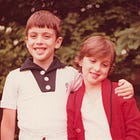This is not a ghost story. But there is a ghost in it.
My family's ghosts are telling me what to write in this memoir. The question is: will I listen?
The apartment my mother, my uncle Andrew and Judy lived in in Nyíregyháza, now dilapidated and abandoned. That didn’t stop me from trying to break in. Poor Karesz is worried about what I might do next.
It was a sunny morning in June when I spotted my uncle at my aunt* Judy’s unveiling.*
I wasn’t sure it was him at first. It has been a while and he stood on the opposite side of her grave. I cranked my head to get a closer look but he moved in and out of the crowd of the maybe 200 people who came.
Judy’s death came fast and unexpected. She spent most of COVID times caring for her husband who had cancer. In a twist of fate, a surprise cancer killed her, while her husband miraculously made a complete recovery. I can’t help but believe that this was her final, cosmic gift to him, although I am certain he didn’t want it.
My uncle Andrew and Judy were very close, as close as Andrew could be to people, so on one hand it made sense that he was here. They grew up as siblings: my mother and Judy were already living together in their apartment in Nyíregyháza with their parents when Andrew was born.
“Judy always wanted a baby brother,” my mom told me. “She pretended Andrew was her own. She even chose his name.”
Even in the years before he died, Andrew could trust Judy not to judge him. My mother and uncle fought terribly most their lives. Judy was always the peacemaker. I think about that a lot, as the years tick by where I don’t speak to my own brother. There is only the two of us. We don’t have a Judy.
(Read my story on my alienation from my brother in The Replacements.)
Still, it’s highly unusual to see him here. For one, I’ve never seen him in a cemetery, even when his own father — my grandfather — died. He stayed outside, just near the fence. It’s prohibited for Kohenim* to enter cemeteries and as an Orthodox Jew, he took his obligations very seriously — maybe even too seriously.
Also, he died over 16 years ago.
This is not a ghost story, even though there is a ghost in it. My uncle didn’t appear ghostlike (I have some experience with this. As I go through all my writing for this memoir, I realize how haunted I really am).
Andrew stood around like everyone else, wearing clothes in his signature disheveled Orthodox-punk style. He looked younger than when I last saw him, in the hospital where he arrived as a John Doe and fell into a coma.
I stared him down, hoping to get his attention. My only way to reach him would be to cross Judy’s grave in the crowd and I wasn’t prepared to do that. I looked around to see if anyone else noticed, but they apparently didn’t. I tried to figure out what brought him here, but the answer was obvious. He was here for Judy. His gaze never left her tombstone.
I thought about my uncle’s visit when I tried (and failed) to return to the Napkor cemetery in the forest. Judy’s mother and my grandfather were brother and sister. Judy’s family would be buried in that same cemetery in Napkor and, as Kohenim, somewhere close to the edge of the cemetery so that family could visit.
When I managed to visit the Napkor cemetery last year, I tried to feel my way near the fence. I wasn’t there long enough to feel any spirits, only tremendous loss. That loss felt even deeper this year, when I didn’t make it to the cemetery. I still can’t shake the idea that some spirit wanted to keep me away.
Lately, I’ve fallen down a rabbit hole trying to figure out who owns the cemetery in Napkor. There is no longer a Jewish community there. The Jewish leaders in the neighbouring community say they know nothing about the cemetery.
I discovered that the last “caretaker” of the cemetery was a man named Professor György Haraszti. He was a lawyer, and professor at the Jewish Theological Seminary. He was likely the caretaker since his family were landowners in the area — maybe the very last Jewish person who had ties to Napkor. He had no children as far as I can tell and died just last year. Any human attachment to the cemetery appears to have died with him.
Somehow, like the synagogue, I can’t let the story of Napkor’s cemetery go. Falling further into anonymity strikes me as a second death.
What I do know is that I have my own ghosts leading me. Most of the time it’s my grandmother, but on occasion, she lets others in. They crowd around when I summon them on Shabbat. They are telling me where to look and sometimes, where not to. They are giving me hints. They know I can see them. I just need to quiet my brain, and learn to listen to them speak.









